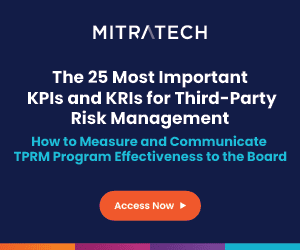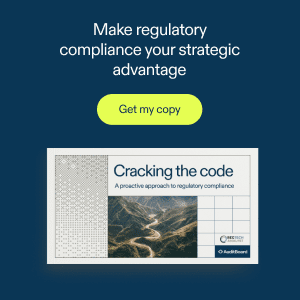Embracing New Technologies
Fenergo’s Laura Glynn discusses how banks around the world are embracing a more digitalized and transformative approach to compliance and, indeed, client life cycle management. Read Part 1.
The global financial services industry is currently on the brink of a massive technological disruption. Financial institutions are now beginning to actively explore new technologies, such as artificial intelligence (AI), robotic process automation (RPA) and blockchain to further automate routine AML and KYC processes, enabling them to improve operational efficiencies and resource utilization and, most importantly, giving them the ability to refocus and redouble efforts around improving client experience.
Historically, Nordic banks have been ahead of the curve in embracing digital innovation. One Finnish banking group launched its internet banking services in 1996, being the second bank in the world and the first in Europe to do so.[1] The region boasts a high level of digital readiness, moreover, and a population open to using the latest technologies.
However, in recent years, Nordic banks have lagged behind their European and U.S. counterparts in updating AML/KYC technologies to support a more efficient and effective compliance process. In very recent times, we’ve seen an increase in regulatory scrutiny on IT compliance systems, with Nordic regulators urging banks in the region to update and improve their IT systems.
Notably, we’re now witnessing a divergence from past IT neglect, with Nordic banks now actively exploring how new-wave technologies can digitalize various compliance and client life cycle management processes to create increased efficiencies that deliver a better client experience and reduce associated regulatory cost pressures. These are outlined below:
Artificial Intelligence (AI)
One of the most powerful ways AI can be applied in a client due diligence context is in using natural language processing (NLP) to “read” vast amounts of information in any language.
This can be a great assistance in the onboarding phase. As well as massively reducing risk, it can improve sales effectiveness and enhance the overall client experience.
The real power of the technology lies in its ability to intelligently extract risk-relevant facts from a huge volume of data, but then to also synthesize and deduplicate that information so that it is both meaningful and concise. This allows unstructured data from different sources and formats to be classified automatically for the KYC profile. Eliminating false positives and irrelevant results makes analyzing true risk a much easier task.
Machine learning can further identify candidates for automation by observing trends in user behavior. Once a client portrait emerges, it becomes possible to predict or model future customer actions. By utilizing AI-powered solutions to delve deeper into customer relationships, financial institutions can prepare for a more regulated future.
Robotic Process Automation (RPA)
Robotic process automation (RPA) enables financial institutions to automate repetitive, non-value added and data-intensive tasks. It is an ideal technology for a field like compliance that is predominantly rule-based and evolving constantly.
RPA can be used to validate existing customer information (structured/unstructured) by accessing databases, extracting data from documents, merging data from different places and filling in forms.
Implementing RPA can streamline KYC decision-making through more effective client data capture and regulatory client classification and evidencing. With the addition of bots, RPA automates the client data entry process and conducts initial verification, passing relevant client records to client services if data gaps prevail. In addition, RPA solutions can automatically consume information (data and documents) from multiple vendors and utilities. This improves overall data quality and speeds up the time it takes for account setup and client/product onboarding.
In terms of AML and risk rating, RPA can also make decisions related to AML alert types, PEPs and sanctions, leaving higher-risk alerts and clients for AML and KYC professionals to check. It further aids the digitalization of client documentation, providing best-guess attempts to categorize and index information, with users required only to complete a final review.
Blockchain
Know your customer (KYC) processes oblige banks to validate and verify primary documents as part of due diligence. Currently, the market includes KYC utilities that help manage these documents and share them with multiple entities. In some cases, these utilities may even have the capability to perform due diligence, but regulations are such that the task of due diligence and investigation is still managed directly by client onboarding teams at financial institutions due to the business and reputational risks involved.[2]
In this environment, blockchain’s attributes of security, distributed replicated data and decentralization appear to provide a potential solution to improving both efficiency and the customer experience by reducing processing costs and enabling the banks to focus on more customer-focused activity.
According to the PwC Global FinTech Report 2017, 77 percent of financial services executives expect to adopt blockchain as part of an in-production system or process by 2020.[3] While the payments and securities settlement space has seen significant progress with blockchain/distributed-ledger based solutions, the KYC and AML space is still in an embryonic stage. Since the blockchain is an immutable shared ledger of transactions that is maintained by a network of computers rather than a centralized authority, it potentially creates a shared golden source of data, reducing errors and the need for reconciliation.
Blockchain may assist banks by streamlining the client identity verification process with details like source of funds, business interests and history, while also monitoring the progress along the way. Every bank and financial institution has to carry out the KYC process individually and upload the validated information and documents to the central registry that stores digitized data tagged to a unique identification number for each customer. This reference number enables banks to access the stored data to perform due diligence whenever customers request a new service within the same banking relationship or from another bank.
A blockchain-based registry could remove the duplication of effort in carrying out KYC checks. The ledger could also enable encrypted updates to client details to be distributed to all banks in near real-time. The KYC ledger could also provide a historical record and full audit trail of all activities, documents shared and compliance activities undertaken for each client. This will form the evidence to be provided to the regulators.
Conclusion
Intensifying regulatory scrutiny and rising compliance costs have resulted in a fresh perspective to KYC and AML compliance in terms of digital transformation, operational efficiency and the agility required to deliver new forms of customer value in an increasingly competitive climate.
Many Nordic banks are now seeking to create a “centre of excellence” approach through the centralization of all client onboarding, AML and KYC operations across multiple business units and jurisdictions. To achieve this, they are actively exploring forms of intelligent automation and emerging new technologies to digitalize client life cycle management, streamlining data management and regulatory compliance processes.
For further information, please refer to Fenergo’s Nordics in Focus white paper series.
[1] Deloitte, ‘FinTech in the Nordics’, 2017
[2] FinExtra Blog, ‘KYC and Blockchain’, March 30th, 2017
[3] Pwc Global FinTech Report 2017



 Laura Glynn, CAMS, is Director of Regulatory Compliance at Fenergo. As such, she is responsible for managing Fenergo’s Regulatory Roadmaps to ensure Fenergo clients are fully future-proofed from a compliance perspective. Laura and her team run regular Regulatory Forums with Fenergo’s global client base to translate key regulatory requirements into rules-based logic ahead of compliance deadlines. With over a decade’s experience working in the area of risk and compliance, across hedge, mutual and private equity products, Laura has cultivated a strong focus on AML and regulatory compliance. Laura is ACAMS certified and holds a B.Sc. degree in Government & Public Policy from University Collect Cork and a diploma in Applied Finance Law from the Law Society of Ireland.
Laura Glynn, CAMS, is Director of Regulatory Compliance at Fenergo. As such, she is responsible for managing Fenergo’s Regulatory Roadmaps to ensure Fenergo clients are fully future-proofed from a compliance perspective. Laura and her team run regular Regulatory Forums with Fenergo’s global client base to translate key regulatory requirements into rules-based logic ahead of compliance deadlines. With over a decade’s experience working in the area of risk and compliance, across hedge, mutual and private equity products, Laura has cultivated a strong focus on AML and regulatory compliance. Laura is ACAMS certified and holds a B.Sc. degree in Government & Public Policy from University Collect Cork and a diploma in Applied Finance Law from the Law Society of Ireland. 








